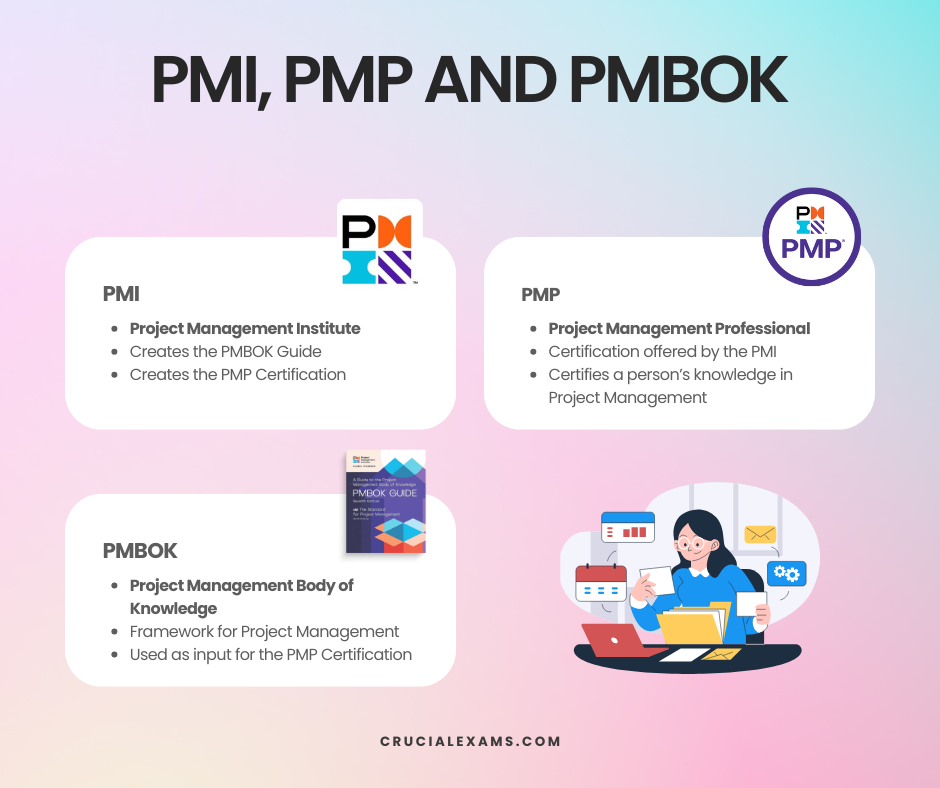What is the difference between PMP and PMI?

Understanding PMP, PMI and PMBOK
When you step into the world of project management, you'll often come across terms like PMP, PMI and PMBOK. These abbreviations might seem a bit confusing at first, but they're important for anyone aiming to excel in managing projects. Let’s take a closer look at what each of these terms stands for and how they differ from one another.
What is PMI?
PMI stands for the Project Management Institute. It's a global not-for-profit organization that helps advance the field of project management. Established in 1969, PMI sets the guidelines for project management and offers various resources to support professionals in this field. Their mission is simple: to boost project success rates and ensure that projects around the world run more smoothly.
PMI offers many types of certifications and educational programs for project managers of all skill levels. These programs are designed to keep project managers updated on the latest industry trends, best practices, and tools of the trade. PMI is also responsible for publishing the Project Management Body of Knowledge (PMBOK), which serves as a guide for project management practices.
With over half a million members globally, PMI plays a key role in connecting project managers from different industries. They organize events, webinars, and local chapters, so professionals can network, share experiences, and learn from each other. This sense of community keeps project managers connected and informed in a rapidly changing world.
What is PMP?
PMP stands for Project Management Professional. It's one of the certifications offered by PMI and is globally acknowledged as a leading certification in project management. Holding a PMP certification means a project manager has the needed skills, know-how, and experience to lead and manage projects successfully.
To earn a PMP certification, candidates must meet certain prerequisites. This typically includes several years of experience in leading projects and a secondary or four-year degree. Candidates must also complete training hours in project management education before they can take the PMP exam. The exam itself is challenging, testing a candidate's understanding of project management principles and their application.
Passing the PMP exam is a major accomplishment and can open up advanced career opportunities in project management. It shows employers that you can handle complex projects and possess a deep understanding of the PMBOK guidelines. PMP certification holders are sought after across various industries, such as IT, healthcare, construction, and finance.
How PMP and PMI Are Related
PMI and PMP are closely connected, but they're not the same thing. PMI is he organization that establishes and maintains the standards of project management globally. They're the ones driving the advancement of project management as a profession. PMP, on the other hand, is a certification provided by PMI to individuals who excel in project management proficiency.
What is PMBOK?
The Project Management Body of Knowledge (PMBOK) is a framework that outlines best practices, standards, and guidelines for effective project management. Developed by the Project Management Institute (PMI), it serves as a foundation for managing projects across industries. PMBOK provides a structured approach by defining processes, tools, and techniques for project initiation, planning, execution, monitoring, and closure. It is continually updated to reflect evolving methodologies and trends, including Agile and hybrid project management practices. For professionals pursuing the Project Management Professional (PMP) certification, PMBOK is an essential resource for understanding key concepts and preparing for the exam.
Summary
Understanding the basics of PMI, PMP, and PMBOK is essential for anyone looking to excel in project management. PMI is a global organization that advances the project management profession through resources, certifications, and community initiatives. PMP, a certification offered by PMI, demonstrates a project manager’s expertise and ability to lead projects successfully, while PMBOK serves as a guide to project management best practices and methodologies. Together, these elements provide a strong foundation for professionals to enhance their skills, stay updated on industry trends, and achieve career growth in project management.
This story is tagged under...
Project Management ProfessionalInterested in contributing to our blog or partnering with us? Want to share your story of how Crucial Exams helped you? Contact Us .